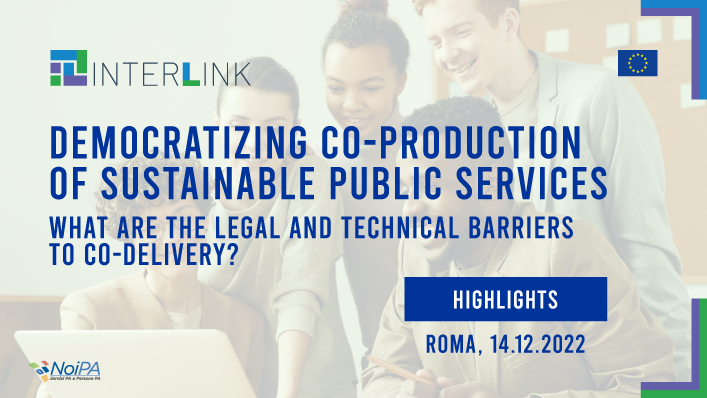INTERLINK Project: highlights from the General Assembly
A summary of the workshop "Democratizing co-delivery of sustainable public services: what are the legal and technical barriers to co-delivery?"

On 14 December, on the occasion of the fifth General Assembly of the European project INTERLINK, a workshop entitled: "Democratizing co-production of sustainable public services: what are the legal and technical barriers to co-delivery?" was held.
The initiative was attended by several experts in the field, for a reflection on new approaches and methodologies for the delivery of public services and products based on democratization and co-delivery processes, which allowed to highlight the contribution of the INTERLINK project on the topic.
One of the first experts to take the floor was Marco Pistore, Director of the Digital Society Centre of the Fondazione Bruno Kessler, a research institute with the coordinating role of the INTERLINK project. According to the vision of the organization he represents, the conditions must be created to ensure that the new technologies have a positive impact and one of the elements that can take important steps in this direction is the democratization of the co-production process.
This democratization, as pointed out by Giuseppe Parise, Director General of the Information Systems and Innovation Directorate (DSII) of the Ministry of Economy and Finance (MEF), is at the basis of the innovative approach to the co-design of services and products for public administration, citizens and businesses proposed by the INTERLINK project. In this sense, the initiative represents an opportunity for the Italian and European PA to enhance the participation of citizens in terms of the quality of services offered.
Matteo Gerosa, Coordinator of INTERLINK, explains that the idea of the project was born with the aim of converging the European Union's initiatives aimed at regulating interoperability and the use of software, which often fail to involve those who have to use the services, citizens and third sector organizations, towards the initiatives coming from citizens who organize themselves autonomously to provide services to other citizens, with a certainly positive spirit that nevertheless presents critical issues related to legitimacy and accountability. Two different approaches, therefore, whose synthesis can help overcome the main obstacles preventing PAs and citizens from exploiting the potential of ICT to co-produce services.
The next panel, devoted to "Innovative experiences of co-creation of public services", addressed the aspects that can contribute to making public services and platforms used by citizens more inclusive.
The first topic addressed by both Francesco Paorici, Director General of the Digital Italy Agency (AgID), and Monica Gabrielli, Head of Strategy and Development of New Activities at Sogei, was accessibility, an aspect that, if properly governed, is able to guarantee the participation of citizens, regardless of their motor, visual, hearing or cognitive capacity. Another relevant aspect, emphasized by Daniel Sarasa Funes, Director of the Zaragoza City of Knowledge Foundation, is that of the construction of data sharing platforms, enabling data to be included in a co-creation process. Marco Maria Pedrazzo, Head of Design, Department for Digital Transformation and Service Owner of Designers Italia - Presidency of the Council of Ministers, emphasized that institutions need innovators, who must be specifically dedicated to the care of the public sector, to ensure the development of a culture of change in this sector as well.
The theme of collaboration was underlined by Diego Lopez de Ipina Gonzalez de Artaza from the University of Deusto, who, in presenting the three use cases of the Interlink project, stated that in order to make co-production sustainable, it is necessary to valorize the contributions that different stakeholders, teams and users can offer.
The use cases, realized by three European public administrations (for Latvia by the Ministry of Environmental Protection and Regional Development, for Spain by the Municipality of Zaragoza, for Italy by the Ministry of Economy and Finance), propose a collaborative approach for the design, development and delivery of public services, to increase trust and improve the quality of services offered, as well as providing good practices that can be replicated in other organizations.
In particular, the Italian use case, presented by Roberta Lotti, Head of the Innovation and European Projects Office of the Directorate for Information Systems and Innovation of the Ministry of Economy and Finance, is based on the design of a Participatory Strategic Planning Module (PSPM); the objective is to verify how the support of technical and methodological solutions in the approach of co-designing services in the public sector can contribute to the production of potentially more effective solutions.
The workshop ended with the final thanks of Matteo Gerosa, who emphasized that the initiative had been a useful opportunity for discussion and reflection.
A recording of the event is available at the following link.
17/01/2023


